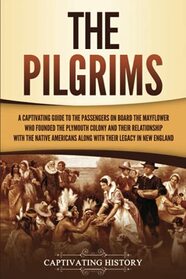First of all, I have a problem keeping the Pilgrims clear from the Puritans. In order to keep them straight, I made up a list. Note, the groups were the opposite of each other in many ways.
PILGRIMS --
A few came to America,
Poor class & soldiers, generally uneducated,
Wanted to separate from the Church of England,
Came over in one ship (Mayflower),
A good relationship with Native Americans and traded food for furs.
Mayflower Compact -- All men participate in majority rule.Had town meetings to discuss issues.
Eventually moved from communal property to individual properties. Food then became abundant.
PURITANS --
Many came to America,
Upper middle class, educated,
Wanted to 'purify' the Church of England (not separate from it, like the Pilgrims),
Came over in multiple ships,
A poor relationship with Native Americans; Puritans thought they should be killed.
Only Puritan ministers could make rules, based on the Bible.
Strict rules and harsh punishments.
Oliver Cromwell was a Puritan.
It was interesting to learn that the French were the first to sell guns to the Indians. Before long, the Indians had more weapons than the Pilgrims. Another interesting insight was the Great Colonial Hurricane of 1635. Because of the extensive damage, famine again raised its ugly head in the Colonies.
Using the legend above helped me keep the groups separate in my mind (because by page 70), the Puritans were flooding into the area already inhabited by the Pilgrims. And the Pilgrims weren't pleased about it.
This book makes a point that the Virginia colonies, the loyalists, and the Quakers had more influence on what America is today (rather than the Pilgrims or even the Puritans). The Puritans worked for their church and community (not themselves). However, in only one century, the Puritans moved to individual ownership. Early Americans valued free choice and voluntary consent. That ideology continues to this day.
PILGRIMS --
A few came to America,
Poor class & soldiers, generally uneducated,
Wanted to separate from the Church of England,
Came over in one ship (Mayflower),
A good relationship with Native Americans and traded food for furs.
Mayflower Compact -- All men participate in majority rule.Had town meetings to discuss issues.
Eventually moved from communal property to individual properties. Food then became abundant.
PURITANS --
Many came to America,
Upper middle class, educated,
Wanted to 'purify' the Church of England (not separate from it, like the Pilgrims),
Came over in multiple ships,
A poor relationship with Native Americans; Puritans thought they should be killed.
Only Puritan ministers could make rules, based on the Bible.
Strict rules and harsh punishments.
Oliver Cromwell was a Puritan.
It was interesting to learn that the French were the first to sell guns to the Indians. Before long, the Indians had more weapons than the Pilgrims. Another interesting insight was the Great Colonial Hurricane of 1635. Because of the extensive damage, famine again raised its ugly head in the Colonies.
Using the legend above helped me keep the groups separate in my mind (because by page 70), the Puritans were flooding into the area already inhabited by the Pilgrims. And the Pilgrims weren't pleased about it.
This book makes a point that the Virginia colonies, the loyalists, and the Quakers had more influence on what America is today (rather than the Pilgrims or even the Puritans). The Puritans worked for their church and community (not themselves). However, in only one century, the Puritans moved to individual ownership. Early Americans valued free choice and voluntary consent. That ideology continues to this day.




